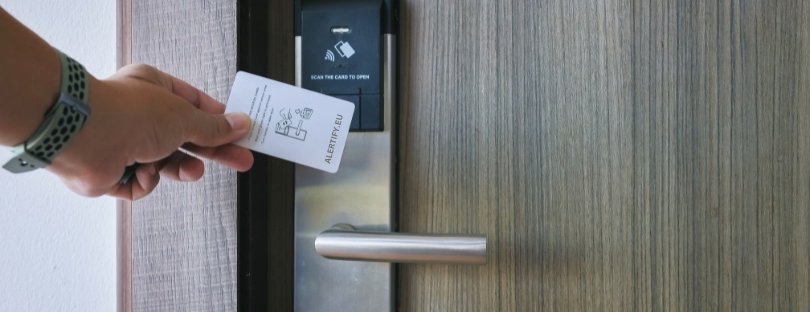
Future of Smart Room Technology: Trends and Innovations
In today’s rapidly evolving technological landscape, the hospitality industry is embracing smart room technology to enhance guest experiences, optimize operations, and increase energy efficiency.
As we delve into the future of smart room technology, we explore the emerging trends and innovations that are reshaping how we interact with our living spaces.
The Rise of the Internet of Things (IoT) in Hospitality
The integration of the Internet of Things (IoT) is at the forefront of smart room technology. This interconnected network of devices allows for seamless communication between various systems within a room. From smart thermostats and lighting systems to automated blinds and entertainment units, IoT-enabled devices are transforming the guest experience.
Seamless Connectivity and Control
Guests can now control their room environment through a single application on their smartphones or tablets. This capability allows for personalized settings, ensuring that the room’s temperature, lighting, and entertainment options align perfectly with individual preferences. Voice-activated assistants, such as Amazon Alexa and Google Assistant, are increasingly being integrated into hotel rooms, enabling guests to control their surroundings effortlessly through voice commands.
Personalization through Data Analytics
The use of data analytics in smart room technology is revolutionizing guest personalization. By analyzing guest behavior and preferences, hotels can tailor their offerings to meet the specific needs of each visitor. For instance, if a guest consistently adjusts the room temperature to a particular setting, future visits can be pre-configured to accommodate that preference automatically.
Creating Memorable Experiences
This level of personalization goes beyond mere comfort; it enhances the overall guest experience. Hotels that leverage data analytics can provide bespoke services, such as customized welcome amenities, room layouts, and even personalized recommendations for local attractions. The ability to anticipate guest needs not only fosters loyalty but also encourages positive reviews and repeat visits.
Energy Efficiency and Sustainability
As the world becomes increasingly aware of environmental concerns, smart room technology plays a crucial role in promoting energy efficiency and sustainability. IoT devices can monitor and optimize energy consumption in real-time, reducing waste and lowering operational costs for hotels.
Smart Energy Management Systems
Hotels are now implementing smart energy management systems that automatically adjust heating, cooling, and lighting based on occupancy. For example, if a room is unoccupied, the system can automatically lower the temperature and turn off lights to conserve energy. These practices not only minimize costs but also align with the growing consumer demand for eco-friendly practices.
Sustainable Design Innovations
Moreover, the integration of smart technologies is prompting hotels to rethink their architectural and interior design choices. Sustainable materials and energy-efficient appliances are being prioritized in new constructions and renovations. This shift towards sustainable design is not only beneficial for the environment but also enhances the hotel’s marketability to eco-conscious travelers.
Enhanced Security Features
As smart room technology advances, so does the need for robust security measures. The implementation of smart locks and surveillance systems is becoming standard practice in hotels, providing enhanced security for guests.
Contactless Check-In and Keyless Entry
Contactless check-in processes, enabled by mobile applications, allow guests to bypass the front desk altogether. Upon arrival, guests can use their smartphones to unlock their rooms, ensuring a safe and seamless experience. This innovation not only enhances convenience but also reduces physical contact, a feature that has gained prominence in light of recent global health concerns.
 Real-Time Monitoring and Alerts
Real-Time Monitoring and Alerts
Smart surveillance systems equipped with AI capabilities can monitor hotel premises in real-time. These systems can detect unusual activities and send immediate alerts to security personnel, ensuring a swift response to potential threats. Such enhanced security features instill confidence in guests, making them feel safer during their stay.
Integration of Augmented and Virtual Reality
The hospitality industry is beginning to explore the potential of augmented reality (AR) and virtual reality (VR) to enhance the guest experience. These technologies can provide immersive experiences that extend beyond traditional hotel services.
Virtual Room Tours
Hotels can utilize VR technology to offer prospective guests virtual tours of their facilities. This innovative approach allows potential customers to experience the ambiance and amenities of a hotel before making a reservation, ultimately influencing their decision-making process.
AR for Enhanced Interaction
AR applications can also be used within hotel rooms to provide guests with interactive experiences. For example, guests could point their smartphones at a QR code in their room to access additional information about hotel amenities, local attractions, or dining options. This level of engagement enriches the overall experience and encourages guests to explore their surroundings.
The Role of 5G Technology
The rollout of 5G technology is set to further revolutionize smart room technology. With significantly faster internet speeds and lower latency, 5G enables hotels to implement even more sophisticated smart solutions.
High-Speed Connectivity
Guests can enjoy seamless connectivity for all their devices, facilitating smooth streaming, video conferencing, and gaming experiences. The increased bandwidth provided by 5G allows for more devices to be connected simultaneously without compromising performance.
Enhanced Smart Features
Moreover, 5G technology will enable the development of advanced applications that rely on real-time data, such as remote health monitoring systems and advanced guest feedback solutions. As hotels adopt these technologies, they will be able to offer even more innovative services to enhance the guest experience.
The Future of Smart Room Design
As we look towards the future, smart room technology will continue to evolve, influencing not only the functionality of hotel rooms but also their design. Biophilic design, which emphasizes the connection between indoor spaces and nature, will likely play a significant role in future developments.
Integration of Nature-Inspired Elements
Hotels may incorporate more natural materials and greenery into their designs, creating a calming atmosphere that enhances guest well-being. Smart technology can help maintain these natural elements by monitoring environmental conditions to ensure optimal growth and health.
Flexible Room Configurations
The future may also see more flexible room configurations, allowing guests to customize their space according to their needs. Smart furniture that can be easily rearranged or adjusted will become more prevalent, enabling guests to create an environment that suits their preferences, whether for relaxation, work, or entertainment.
Conclusion
In conclusion, the future of smart room technology is brimming with opportunities for innovation and enhancement in the hospitality industry. By embracing IoT, data analytics, energy efficiency, enhanced security, AR, VR, and 5G technology, hotels can create personalized, immersive, and sustainable experiences that resonate with modern travelers. As we move forward, the continuous evolution of smart room technology will redefine how we interact with our living spaces, setting new standards for guest satisfaction and operational efficiency.






 Real-Time Monitoring and Alerts
Real-Time Monitoring and Alerts



